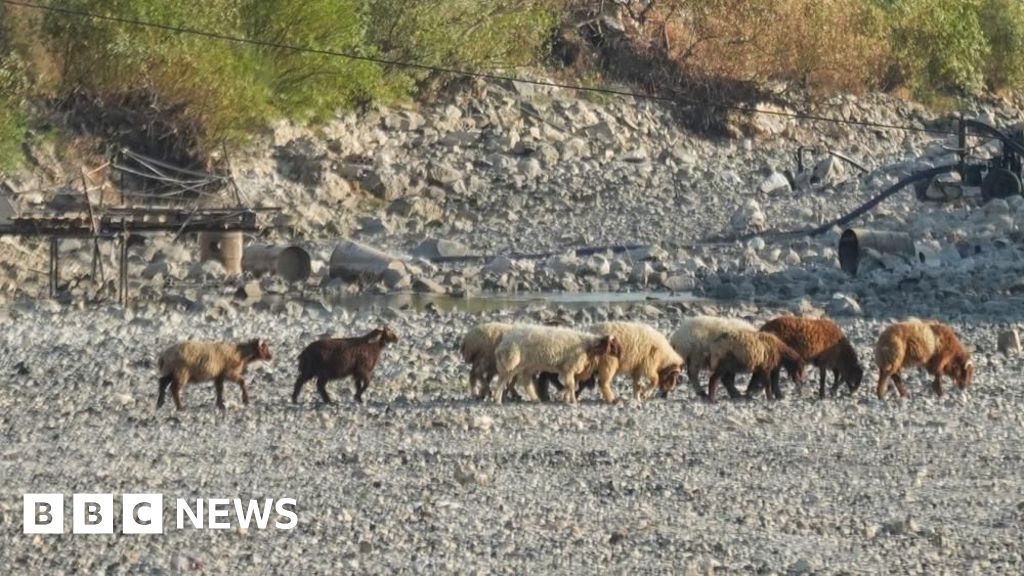Mark Poynting
Climate reporter, BBC News
Two major new reservoir projects have been fast-tracked in a bid to shore up England's water supplies, the government has announced.
The projects in East Anglia and south Lincolnshire have been declared "nationally significant", allowing them to speed through the planning process.
But overriding local objections can be unpopular and the reservoirs could still be more than a decade away from opening.
Household consumption of water may also need to fall to secure supplies amid rising temperatures and a growing population, scientists warn.
The announcement means that final decisions about the Fens Reservoir in Cambridgeshire and the Lincolnshire Reservoir will be taken by Environment Secretary Steve Reed, rather than at a local level.
This change amounts to "slashing red tape to make the planning process faster" to "secure our water supply for future generations", according to Water Minister Emma Hardy.
The two reservoirs are currently pencilled for completion in 2036 and 2040 respectively.
They "would provide more resilience to future droughts in a part of the country that is already dry and where there is high demand for water," said Dr Glenn Watts, water science director at the UK Centre for Ecology & Hydrology.
Reservoirs can help protect against the impacts of drought by collecting excess rainfall during wet periods.
With climate change likely to bring hotter, drier summers, the chances of drought could increase in the decades ahead, the Met Office says.
These preparations have been brought into sharp focus by this year's exceptionally dry spring.
Extra demand from new houses, data centres and other sectors could further squeeze supplies, but no major reservoirs have been completed in England since 1992, shortly after the water sector was privatised.
Last year the government and water companies announced proposals to build nine new reservoirs by 2050.
Together they have the potential to provide 670 million litres of extra water per day, they say.
That's in addition to the Havant Thicket reservoir project in Hampshire, which is already under way and is expected to be completed by 2031.
The government also says that it intends to pass legislation to automatically make the other seven proposed reservoirs "nationally significant" too.
"Reservoir projects are very complex infrastructure projects that are slow to take forward, and so anything that can be done to streamline that process can be a positive thing," said David Porter, senior vice president of the Institute of Civil Engineers (ICE).
The water industry has also welcomed the announcement.
"It's absolutely critical that we build these reservoirs now," David Henderson, chief executive of Water UK, told BBC News.
"If we don't build them now, we wait another 10 years, it's going to cost even more, so we can't keep kicking the can down the road any longer."
But building reservoirs doesn't come cheaply, even with accelerated planning processes. That could ultimately filter down to people's bills.
Nor does it come quickly. No new major reservoirs are due to be completed this decade.
Some experts warn that managing how we use water needs to take greater precedence in a warming climate.
"We need a complete overhaul of the way we use water, to plug leaks, cut down on waste and store water where it falls as rain," said Prof Hannah Cloke of the University of Reading.
"It would be better to make more difficult decisions around regulation of new building, as well as retrofitting older homes and businesses, to cut waste and recycle water where it is used, rather than pumping water across huge distances," she added.
And like any major project, the new reservoirs could prove unpopular with local communities, particularly those whose homes and farmland are cleared to make way for them.
"The decision by the government to fast-track through the 'national significant infrastructure' route is in my opinion very bad and will make the public very angry," argued Dr Kevin Grecksch of the University of Oxford.
But David Porter of ICE stressed the need to take decisions "for the greater good".
"Now, that's not to say that we should ride roughshod over the views of local people, and that's not to say that every project is justifiable," he said.
"But if the decision maker is satisfied that on balance it is the right thing to do, you need to find a way through the objection in order to deliver these projects."
In response to the government's announcement, shadow environment secretary Victoria Atkins blamed Labour's farming and immigration policies for pressures on water supplies.
"The last Conservative government left behind a robust, coherent plan to safeguard food security and reduce net migration by more than half. Labour has chosen to abandon those plans and in doing so, it has surrendered control over both our rural community and our borders," she said.

 3 months ago
136
3 months ago
136

















































